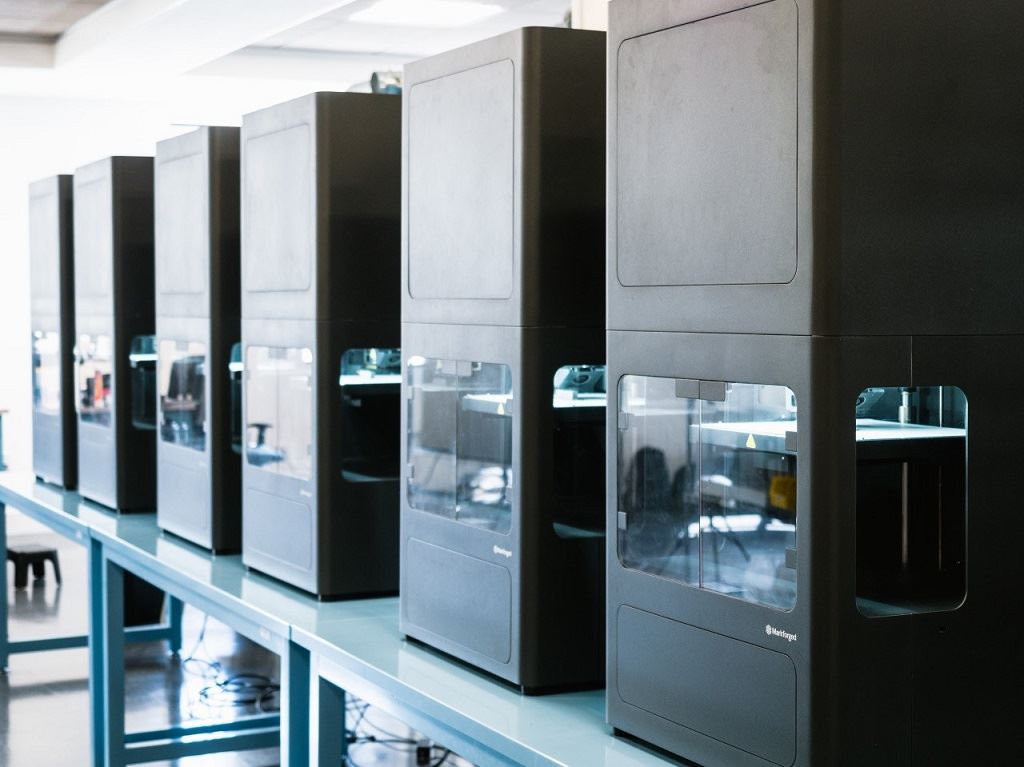![Metal X 3D printer farm setup [Image: Markforged]](https://fabbaloo.com/wp-content/uploads/2020/05/markforgedprintfarmmetal_img_5eb09179ee286.jpg)
3D printer farms aren’t a new concept — but the advantages of grouping together high-strength 3D printing units are growing.
Markforged has just introduced its Print Farms offering. They describe it as “an economic way for customers to build metal and carbon fiber printing capacity with Markforged,” continuing:
“The new packages allow customers to purchase the Metal X systems and X7 printers, priced together, to rapidly create metal, composite, and hybrid parts that leverage both materials for high-throughput 3D printing. Managed from one centralized, cloud-based software platform, Markforged Print Farms unlock access to a full range of industrial materials on one platform and the opportunity to print multiple materials in parallel.”
The intent here is to offer to customers a setup that Markforged has itself found to be highly useful for automating and managing regular 3D printing.
Markforged Print Farms
In 2017, the company shared a behind-the-scenes look into its own in-house 3D printer farm, which was at the time running 25 3D printers: “a mix of Onyx Ones, Onyx Pros, Mark Twos, and Mark Xs…[that] crank out thousands of sample parts each week. The print farm produced 10,500 sample parts just in the month of May, with a yield rate of about 92%.”
The team thus knows first-hand how best to set up a successful print farm. At the time, of course, that was limited to their released carbon fiber-capable machines, and has since expanded (presumably also in-house) to include metal capabilities with the Metal X.
Understanding what works best through an in-house setup is a strategy many companies in manufacturing use. We’ve seen it at SLM Solutions, for example, where a full production setup will exactly mirror a customer installation, allowing the SLM team to troubleshoot in their own facility for immediate response.
What Markforged is doing is in a similar vein. They have a working understanding of all that goes into such a setup — and of course it helps too that they are using their farm as a useful system, testing systems and producing sample parts.
An important finding in their in-house work came down to the space logistics of setting up a 25-printer farm. They explain of physical needs, for example:
“We have found that Trinity wire racks work great for our print farm because they can hold four printers and four dry boxes with additional space available on the bottom shelf for tools and bins to organize finished parts. Up to 8 printers can be powered on 120 volts and 20 amps, standardly provided by most building codes in the United States.”
Years of in-house work make underlie the decision to branch out to print farms as a commercial offering.
Customer Print Farms
Taking the step out to offer the print farms as a customer solution indicates a security in thorough understanding of both system capabilities and customer needs.
“We are introducing Print Farms to help customers maximize the efficiency of our Metal X systems. Three to five Metal X printers, one Wash and a Sinter-2 is the optimum package to maximize output. A properly balanced print farm helps companies accelerate their transition to digital manufacturing,” said Jon Reilly, VP of Product at Markforged.
Availability of print farms is, as Reilly notes, customized. He notes in particular the efficiency of the Metal X; carbon fiber systems are of course also available to ensure a fuller gamut of high-strength X7 3D printing options.
Among the material options available are:
-
17-4PH Stainless Steel
-
H13 Tool Steel
-
A2 Tool Steel
-
(Available in September) D2 Tool Steel
-
Composite Onyx materials including Onyx FR and carbon fiber-, fiberglass-, HSHT fiberglass-, and Kevlar-composite materials
In beta are additional metals including 316L Stainless Steel, Inconel 625, and Titanium (Ti-6Al-4V), indicating — as always — further materials development in the pipeline.
Operation
The print farm announcement stands out from most recent introductions from Markforged, which have focused on software and operations.
Though this is more hardware-focused, it also comes at a time that makes the most sense, as software and company positioning are such that support is at its most advanced yet from Markforged.
The company’s Eiger software is optimized for its 3D printers, allowing for cloud-based collaboration and real-time fleet management.
Markforged Print Farms seem to be available now; due to their fully customized nature, there is no set pricing, but quotes are a click away.
Via Markforged











Markforged has received a surprise, undescribed investment from In-Q-Tel. We speculate why this happened.